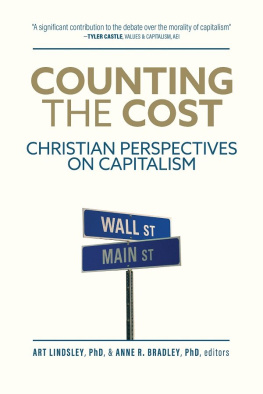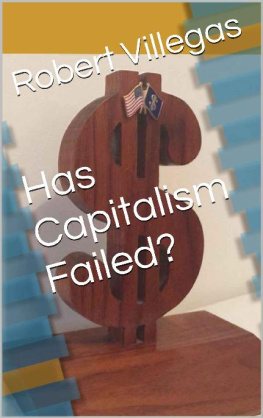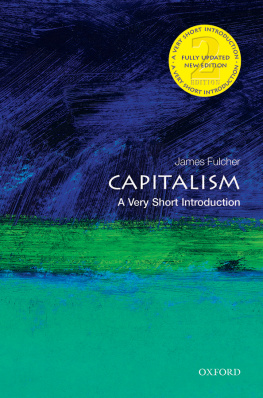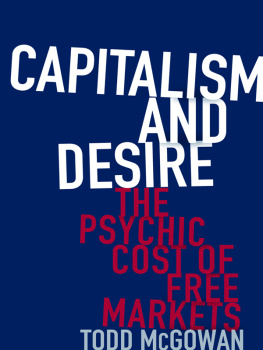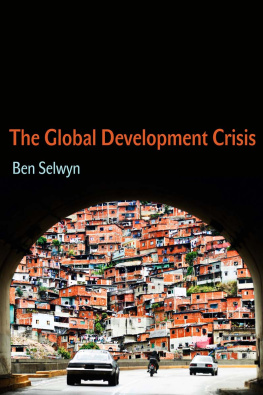ANNE R. BRADLEY
In our efforts as believers to understand whether capitalism, socialism, or some other form of economic system is the best performer, we must first understand what it is that we, as Christians, seek to accomplish in our earthly journeys. That is, what are our personal and societal goals? For that, we must first look to Scripture, which is clear: we are here with a job to do, which is to unleash our talents and gifts, in their different varieties and bundles, on Gods creation. Genesis 2:15 tells us that we were put in the garden to work it and take care of it. The Hebrew word for work in this passage is abad, which in English means to serve. Our job is clear and unchanging: we are to serve Gods creation and each other.
When we obey Gods commands in Genesis, we dont just contribute to flourishing, but we partake in flourishing and contribute to the common good. This requires a specific economic system, one that provides real incentives for people to serve (Christians and non-Christians alike), rather than plunder. What is clear from the course of history is that most people, in material terms, have fought for survival, day in and day out. Through most of human history, people have struggled to eat, to live long and healthy lives, and to evade corrupt and oppressive governments. That most people reading this book can do so electronically, or in an artificially heated or cooled room with electric lighting, is a relatively new phenomenon.
This new standard of living that has exploded onto the planet at an increasingly rapid pace over the past two hundred years is the result not of randomness, but of explicit sets of economic institutions that have fostered service to rather than plunder of strangers. As far back as three hundred years ago, most humans had drastically poorer standards of living: they lived poor and short lives. Moreover, according to Nobel laureate Robert Lucas, the worlds population has more than doubled since the middle of the twentieth century, yet global productivity has grown from $6.5 trillion in 1960 to $31 trillion in 2000. It is possible to both be fruitful, increasing wealth and output through service, and multiply.
In societies where people lack access to these productive economic institutions, there is still illigitmate and oppressive government rule by might and force, and the result for the weak is early death, malnutrition, and oppression. The tragedy is that there are still numerous countries where people suffer daily, with little hope of change.
We must do something for those living in poverty. We cant solve this problem solely through aid and income transfers; we have been doing that for decades, and it hasnt worked. What does work is access to an increased number of trading partners through markets. When a poor woman who is living in a village in Ghana can obtain a cell phone, she then has opportunities to sell access to her cell phone to others, which provides her a chance to increase her income. When we increase trade both domestically and internationally, we give people a chance to use their gifts and talents to serve others. As a result, they can purchase things that they otherwise would have had to make or grow on their own.
Life is treacherous when we are forced inward to rely almost exclusively on our own skills to survive. Think what it would be like to have to grow all your food, purify your water, gather water from the river to wash clothes, and not have a pharmacy nearby when you get the flu. In the immortal words of Thomas Hobbes, life becomes nasty, poor, brutish and short. Trade offers the only escape from this inward life in which we must do everything on our own. Trade frees us to be able to rely on others and benefit, or profit, from their skills. Trade dismantles the oppressors over time as well, because you can only profit in market trade if you serve someone else with what you are selling. Trade liberates, trade is forward-thinking, trade requires that we meet the needs of others, and trade doesnt discriminate based on age or gender or politics. Trade is fueled by profit through service, and trade literally frees us to live longer lives to do exactly what God has asked of us.
Capitalism is the system that allows individuals to dictate what is bought and sold based on their needs and wants through market-based trade. It puts consumers in the drivers seat. To make a profit, sellers must listen to and heed the desires and wants of their customers. This is just, and serves the common good. It is moral in that it provides incentives for service, not plunder. It also provides incentives for us to think about the long run, and not just live for today. It encourages us to save, invest, innovate, and tinker so that we can embrace the entrepreneurial spirit of problem solving. When we problem solve in the pursuit of profit, we serve others, and are ourselves served by others gifts.
The unleashing of human creativity is necessary for biblical human flourishing. Without it, we perish early and often. What capitalism or any other policy cannot do is change the human heart. We are fallen sinners, and prone to errors of omission and commission. We make mistakes, and sometimes intend to harmthis truth applies to believers and nonbelievers alike. No economic or political system can cure this; after all, these systems comprise the very human hearts we desire to fix. Our only hope for the transformation of our hearts is the gospel. Outside of that, we must have a system of economic exchange that fosters service through incentives, which are what motivate us all. We must see the good in serving others and desire to be a part of that. The system of profits and losses, property rights, and prices is the only method ever implemented that has brought humanity out of poverty and into long-term material well-being on a global scale.
Nobel laureate Friedrich A. Hayek, when reflecting on the work of Adam Smith, said:
The main point about which there can be little doubt is that Smiths chief concern was not so much with what man might occasionally achieve when he was at his best but that he should have as little opportunity as possible to do harm when he was at his worst. It would scarcely be too much to claim that the main merit of the individualism which he and his contemporaries advocated is that it is a system under which bad men can do least harm. It is a social system which does not depend for its functioning on our finding good men for running it, or on all men becoming better than they now are, but which makes use of men in all their given variety and complexity, sometimes good and sometimes bad, sometimes intelligent and more often stupid... The chief concern of the great individualist writers was indeed to find a set of institutions by which man could be induced, by his own choice and from the motives which determined his ordinary conduct, to contribute as much as possible to the need of all others; and their discovery was that the system of private property did provide such inducements to a much greater extent than had yet been understood.
What an economic system must do is take humans as we are, in all our feebleness and sin, and encourage us to consider the needs of others. Government-controlled economies have attempted and continue to attempt to transform human behavior through manipulation and the elimination of trade, and the consequences are dire: great suffering and early death. Capitalism, rather than trying to change the sinners heart, takes it as it is and uses a system of incentives to encourage service. The result is greater flourishing, better-protected environments, increased wealth and well-being, and the near-eradication of abject poverty. Capitalism is by no means perfectafter all, it is implemented by humans. In our time on this Earth, perfection cannot be our goal, but we can and must look to the economic system that takes men and women on their worst days and can, more often than not, get them to act in the interests of others. Capitalism is the best chance we have ever had to love our neighbor and to serve strangers.

